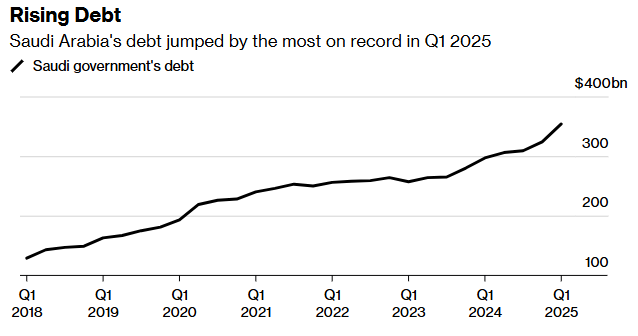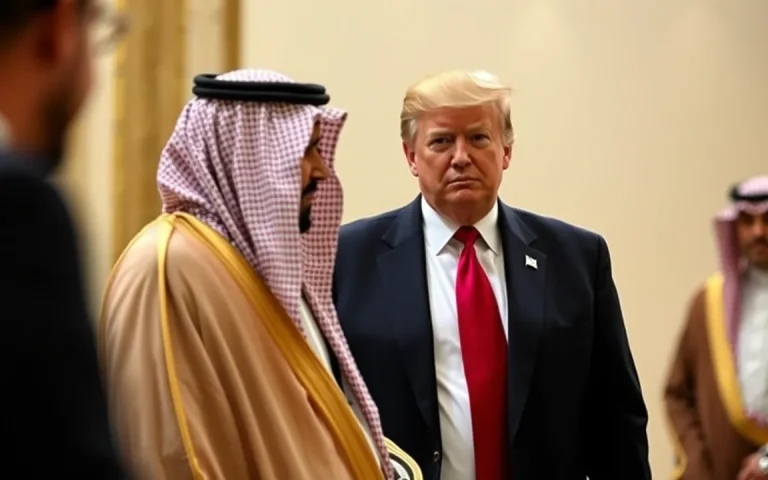
Donald Trump didn’t return to the Middle East for diplomacy. He came for deals.
This week, the president landed in Saudi Arabia to begin a tour of the Gulf with one goal in mind: securing investment.
But not just for the United States; perhaps for himself too.
Trump’s second term has stripped away any pretense about separating politics from business.
The line is gone. His visit to Riyadh, Doha, and Abu Dhabi marks the full merger of statecraft and self-interest.
And this time, he’s brought his family and business empire along for the ride.
What does Trump want from the Gulf?
Trump arrived in Saudi Arabia on May 13 to kick off a three-day investment push across the region.
He’s aiming for $1 trillion in economic partnerships, mostly in AI, semiconductors, defence, and infrastructure.
At the Saudi–US Investment Forum in Riyadh, he’s pitching American innovation in exchange for Gulf petrodollars.
This is not a diplomatic mission in the traditional sense. His delegation includes Nvidia CEO Jensen Huang, BlackRock’s Larry Fink, and Google’s Ruth Porat.
Elon Musk and Sam Altman are reportedly attending too. These aren’t government officials; they’re dealmakers.
Saudi Arabia has already pledged $600 billion over four years.
Qatar is gifting Trump a Boeing 747-8 jet, which he will use as Air Force One and later assign to his presidential library foundation.
Abu Dhabi has committed $2 billion to a crypto venture backed by the Trump Organization.
These are not symbolic gestures. They are financial ties with measurable returns.
What does the Gulf want in return?
The Gulf states are not just handing Trump cash. They are buying access.
Saudi Arabia is seeking a civil nuclear agreement that would allow limited uranium enrichment under US supervision.
It also wants advanced weapons, better access to American AI infrastructure, and legitimacy for Crown Prince Mohammed bin Salman’s economic agenda.
With oil prices at a four-year low and Saudi debt rising, Vision 2030 is under pressure.
In Q1 2025 alone, $30 billion was added to Saudi Arabia’s debt.
Reports from Bloomberg suggest that Saudi Arabia needs oil prices to reach $113 per barrel to break even on Vision 2030’s financing.
Foreign direct investment has declined for three straight years. Projects like NEOM are falling behind schedule.

Trump’s visit is about more than just investment. It’s about showing the world that the Saudi Prince, MBS, still has the keys to Washington, especially as the Biden-era diplomatic freeze fades into the background.
Reports on the luxurious welcome Donald Trump is receiving as soon as he gets off his plane began early on Tuesday.
And for Qatar and the UAE, this is a chance to solidify their place as strategic investors in US tech and finance.
They aren’t asking for military bases or security guarantees. They want equity, board seats, and regulatory influence.
What is the Trump family doing there?
While Trump meets with heads of state, his sons are securing private business deals.
Eric Trump recently announced an 80-story tower in Dubai, calling it the “highest infinity-edge pool in the world.”
In Qatar, the Trump Organization is launching a $5.5 billion luxury golf resort.
In Abu Dhabi, their crypto venture just landed a multi-billion-dollar investment from a local sovereign fund.
The Trump Organization now has active interests in every country on the president’s itinerary. And there is no firewall.
Trump has abandoned his first-term pledge to distance himself from his businesses.
There are no public disclosures, no divestments, no restrictions.
Meanwhile, White House staff who once lobbied for Gulf countries are now signing off on these gifts.
Attorney General Pam Bondi previously worked for Qatar and recently approved the legal basis for the luxury jet gift.
Is this illegal?
It might not be illegal, but it’s definitely not normal.
Under the US Constitution, presidents cannot accept gifts from foreign governments without congressional approval.
But that clause has rarely been enforced. Trump is taking advantage of that legal vacuum.
Unlike traditional presidents who use diplomacy to expand alliances, Trump is using it to expand revenue.
His family business is negotiating private contracts in parallel with public foreign policy. And no one is stopping it.
Congress has said little. The media is overwhelmed. Watchdogs warn this is unlike anything seen in modern history.
What once would have sparked hearings now passes without scrutiny.
The US has moved from foreign policy to foreign partnership, with the presidency itself on the table.
Why does this matter?
Because what Trump is doing could become the norm.
He has created a new template for power: use the White House to pitch your private ventures.
Partner with foreign governments as if they are investors. Sign deals while standing beside diplomats. And don’t bother with transparency.
This trip isn’t just about Saudi Arabia. It’s about America’s future relationship with influence.
If the presidency can be monetized in this way, the entire idea of public service changes. It becomes business development.
What comes next could result in policies that will be increasingly shaped behind closed doors.
Without transparency, it’s impossible to tell where the US public interest ends and Trump’s private interests begin.
What happens when future administrations are asked to uphold or undo Trump-era agreements signed under the guise of private business?
How will allies or rivals view a country whose foreign policy comes with a price tag? How will American credibility hold up when its diplomatic choices are seen as personal investments?
This trip confirms what many feared: American foreign policy is no longer a national strategy. It’s a personal one. And in the Gulf, at least, business is booming.
The post Trump’s Middle East trip: is this the privatization of American foreign policy? appeared first on Invezz

